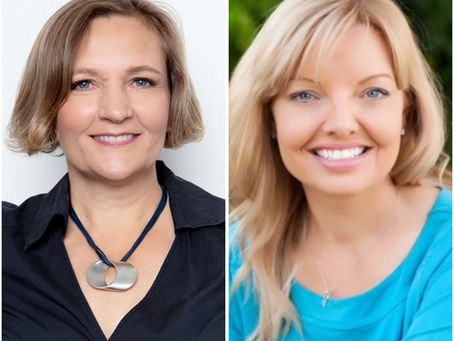top of page

GETTING REEL


Dyslexia Design Thinking: When Neurodivergence and Creativity Meet
how dyslexia offers a heightened advantage, what he calls his “hyper-ability.” Learn how parents and educators can find the hyper-ability in children’s differences and foster these unique strengths to boost self-esteem, school/career pathways, and finding their place in the world.
Feb 3, 2023


Video Game Design: The Where, What and How of College Programs
We spent an hour in conversation with Irene Vassilopoulos, whose oldest child recently explored the video game design programs at colleges across the U.S. How did her family discover and evaluate programs? What was the application process like? Is there anything she wished she’d known before starting the process? Were there any surprises along the way?
Dec 5, 2022


Working Memory and the 2e Learner
Working memory affects every part of a child's life; however, most people know little about it beyond perhaps a score on the WISC test. REEL hosted Thea Slingland, Director of Educational Services for Learnfully, to talk about where working memory is used in daily life and how it affects routines, academics, socializing, and emotions for 2e learners.
Nov 16, 2022


2e Private School Panel 2022
REEL hosted a panel of parents with kids who have attended both private and public schools as well as psychologist Dr. Lisa White of Summit Center, who advises families on schools for 2e learners. We did not record the session in order to protect the privacy of our panelists.
Oct 19, 2022


Private School Parent Panel
Are you considering a private school for your 2e child? Join REEL members Abby Kirigin, Carmen O'Shea, and Callie Turk - three parents of 2e kids that have experienced a dozen Bay Area K-12 schools firsthand and researched 30+ more. Learn about the various foci of local private, public, and charter schools as well as the tradeoffs of each for 2e kids. Ask questions and get answers from the parent perspective.
Oct 15, 2022


Social Skills & the 2e Child
Social skills and social anxiety rank as a top concern for parents of 2e learners. Parents worry their child doesn’t have enough friends, doesn’t attend enough social events, or only engages socially online.
Sep 19, 2022


VIDEO: REEL Speaker Series: Dr. Susan Baum Strategies to Ignite the Reluctant Writer
Writing almost always tops the list of challenges for all types of 2e learners, who have both high ability and potential as well as complex challenges such as specific learning disabilities (e.g. dyslexia), autism, ADHD, and anxiety. Parents and educators need tips to help these students experience success with writing. Renowned 2e expert Dr. Susan Baum joined REEL for a creative and pragmatic discussion on ways to support writing development for 2e learners.
Sep 1, 2022


Working the System: Tap Into Public Schools for Assessment & Support for 2e Learners
Understanding and getting support for 2e learners can be complicated. The public education system is sometimes unwieldy and confusing. When parents suspect their child’s challenges (academic and/or social-emotional) may stem from an as yet undiscovered diagnosis, they often don't know how to start the process of requesting accommodations, assessments, and services. As a result, parents frequently do not leverage the resources of their public schools, which can lead to delays
Mar 29, 2022


Video: Ad Astra: Parenting Your Neurodiverse Child
In this uplifting workshop, Abby Kirigin shares how to help neurodivergent students thrive by celebrating their unique brains. She offers strategies to build confidence and self-efficacy, separate content goals from expression challenges, and integrate strength-based learning into daily life—all to help students re-engage, shine, and face challenges with renewed energy.
Mar 1, 2022


Educator Webinar: Supporting Your Bright But Struggling Students
The workshop explains the strengths and struggles of twice-exceptional (2e) learners, who have distinguishing strengths and learning differences such as ADHD, autism, and dyslexia. The recording includes top tips for supporting 2e learners' needs and vignettes of actual student scenarios.
Jan 24, 2022


Rethinking Adulthood: A Neurodiverse Trajectory (Presented in Partnership with CAC)
What does it mean to be an adult? How is the transition to adulthood addressed in neurodivergent populations? Presented by a neurodivergent educator, we will explore the social and emotional elements of this transition and how we can better support our students and children through this process.
Jan 1, 2022


2e Self Advocacy Panel—Help Your Student Understand Their Brain, and Their Teachers, Too!
students should develop. 2e kids often lose self-esteem when they aren’t able to learn the way the classroom or assignments are organized. Students gain confidence with the success that comes with having their environment or assignments adjusted so they can access their learning abilities. Explore the prerequisites to self-advocacy, discover how to help students understand what their brain needs to succeed at school, learn specific developmentally-appropriate techniques to tr
Dec 27, 2021


VIDEO: Strength-based Learning Discussion with Dr. Melanie Hayes
Dr. Melanie Hayes of Big Minds School discusses strength-based learning for 2e students, emphasizing focusing on strengths rather than just weaknesses. Strengths energize 2e kids, boost self-esteem, and guide future careers. Her Big Minds Unschool methods show how to integrate this approach anywhere. Parents can support strengths at home and in class to increase motivation, address challenges, and heal school trauma. Strength-based learning is key to 2e education.
Dec 27, 2021


Video: Road to Resources for your Twice Exceptional (2e) Child
a roadmap of how to sort through the incredible array of available resources for neuro-assessments, OT, speech, academic support, gender diversity, and more. They walked through real life scenarios, including how to decide what to do first, what to do if you have time but no money or money but no time, and how to navigate private and public schools.
Dec 27, 2021


2e Private School Panel 2021 Takeaways
Twice exceptional, or 2e, students have both high ability and potential as well as complex challenges such as learning differences, autism, ADHD, and anxiety. Dr. Lisa White of Summit Center, Abby Kirigin of REEL, and Carmen O’Shea of Parent Resource Advisors, discussed the signs it's time to make a change, the process of finding a right-fit school for your 2e child, and the application process.
Oct 31, 2021


Neurodivergence Through the Female Lens
girls are commonly overlooked, undiagnosed, or misdiagnosed when it comes to learning differences such as ADHD, autism, and dyslexia? Join us to learn what the research says about this phenomena, its impact on K12 education, and what career paths might work best to better address the needs of neurodivergent females
May 16, 2021


Private School for 2e Learners? Silicon Valley Schools and Beyond
REEL recently hosted a private school panel featuring three parents, Abby Kirigin, Carmen O’Shea, and Callie Turk, who shared their...
Aug 30, 2020


Private School for 2e Learners? Key Considerations
REEL recently hosted a private school panel featuring three parents, Abby Kirigin, Carmen O’Shea, and Callie Turk, who shared their...
Aug 30, 2020


Private School for 2e Learners? Admissions Process & Tips
REEL recently hosted a private school panel featuring three parents, Abby Kirigin, Carmen O’Shea, and Callie Turk, who shared their...
Aug 30, 2020


Neurodiversity Celebration Week March 21-27, 2022
REEL hosted an inspirational Q&A session to honor Neurodiversity Celebration Week 2022 with founder Siena Castellon. Learn about her experiences at school and life and why she created this special week to honor the neurodivergent.
Nov 1, 2018
bottom of page
